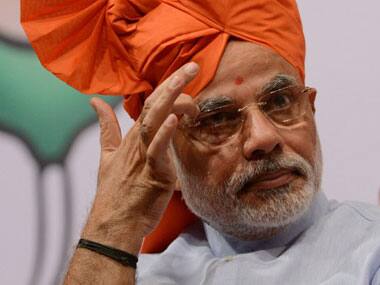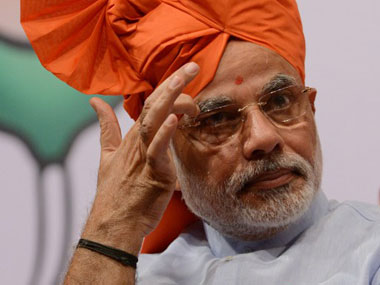Narendra Modi has an RSS problem. That’s clear from an
IPSOS Times of India survey
conducted in 8 major cities across India. The good news for the Prime Minister is that 75% of the respondents think his government has done a good job so far. Only 4% think it has performed poorly. The bad news is 62% feel hotheads of the Sangh Parivar are adversely affecting the government’s development agenda. And that’s a problem because over 2/3 of those surveyed maintain that development and the economy should be the government’s focus. The results should not surprise Modi. He never pretended to be anything but a proud unapologetic Hindu but he sold himself to the voters as an economy-builder, not a temple-builder. Indians are fine, even proud of him, for handing out Bhagvad Gitas to world leaders. But they are not so happy with Ghar Wapsi mega-rallies or Love Jihad hysteria or thugs vandalizing movie theaters screening PK. [caption id=“attachment_2026889” align=“alignleft” width=“380”] Prime Minister Narendra Modi. AFP[/caption] That’s when it becomes a law and order issue. And Indians, whether conservative or liberal, start getting nervous about the perception of a government’s own rank and file running amuck. The BJP should understand that clearly. After all, that’s its main charge and strategy in West Bengal against Mamata Banerjee’s Trinamool which it wants to portray as a party of indisciplined hoodlums. In Kolkata, the BJP’s youth wing protests outside a Kolkata Municipal Corporation-run movie theater against its “Taliban-like” attitude for not allowing in a young woman in a skirt. In Ahmedabad,
Bajrang Dal activists
smash ticket windows and tear posters at movie theaters to protest the screening of PK. The BJP can say it’s different from the Bajrang Dal but in the public perception, it’s all in the family. Modi understands he has a problem and is not happy about it. The Economic Times
reports that after several top-level meetings between the RSS and BJP leaders including the PM, the RSS has quietly dumped Rajeshwar Singh, the man behind the much touted Ghar Wapsi programme. The PM is said to have expressed his annoyance that the row over the programme derailed his legislative agenda. Or at least that’s what we think happened. The PM himself has said little, one way or the other. While the Rajeshwar Singhs and Sadhvi Niranjan Jyotis make their provocative statements in full public glare, the PM chooses to crack his whip in private. So we hear about top level meetings between unnamed BJP and RSS leaders where the PM is supposedly expressing his annoyance. We hear about closed door meetings with BJP parliamentarians where the PM tells them his only agenda is development which is then construed to mean that he is saying indirectly he does not approve of his MPs shooting their mouth off about haramzaadas or Nathuram Godse. What the IPSOS survey indicates is that as confidence building measures, these behind-the-scenes backroom manouvres fall short because Modi has sold himself as a man who communicates directly, and often, with the people. When a controversy about the fiery statements by preacher Jeremaiah Wright threatened to derail his campaign, Barack Obama didn’t just quietly move away from Wright. He spoke publicly and movingly about race in a speech titled A More Perfect Union even though it was a risky move. At this point, a Rajeshwar Singh cannot be dismissed as a stray incident, a loose cannon on the fringe. His boss, RSS chief Mohan Bhagwat, has not only strongly defended ghar wapsi, he has also said, “It is our maal, so we have the right to take it back.” Modi is now stuck between a rock and a hard place. His defenders say the PM needs time to bring the RSS hot heads in line and he cannot be blamed for the excesses of the fringe elements of the Sangh Parivar. Swapan Dasgupta
writes
:
Prime Minister Narendra Modi. AFP[/caption] That’s when it becomes a law and order issue. And Indians, whether conservative or liberal, start getting nervous about the perception of a government’s own rank and file running amuck. The BJP should understand that clearly. After all, that’s its main charge and strategy in West Bengal against Mamata Banerjee’s Trinamool which it wants to portray as a party of indisciplined hoodlums. In Kolkata, the BJP’s youth wing protests outside a Kolkata Municipal Corporation-run movie theater against its “Taliban-like” attitude for not allowing in a young woman in a skirt. In Ahmedabad,
Bajrang Dal activists
smash ticket windows and tear posters at movie theaters to protest the screening of PK. The BJP can say it’s different from the Bajrang Dal but in the public perception, it’s all in the family. Modi understands he has a problem and is not happy about it. The Economic Times
reports that after several top-level meetings between the RSS and BJP leaders including the PM, the RSS has quietly dumped Rajeshwar Singh, the man behind the much touted Ghar Wapsi programme. The PM is said to have expressed his annoyance that the row over the programme derailed his legislative agenda. Or at least that’s what we think happened. The PM himself has said little, one way or the other. While the Rajeshwar Singhs and Sadhvi Niranjan Jyotis make their provocative statements in full public glare, the PM chooses to crack his whip in private. So we hear about top level meetings between unnamed BJP and RSS leaders where the PM is supposedly expressing his annoyance. We hear about closed door meetings with BJP parliamentarians where the PM tells them his only agenda is development which is then construed to mean that he is saying indirectly he does not approve of his MPs shooting their mouth off about haramzaadas or Nathuram Godse. What the IPSOS survey indicates is that as confidence building measures, these behind-the-scenes backroom manouvres fall short because Modi has sold himself as a man who communicates directly, and often, with the people. When a controversy about the fiery statements by preacher Jeremaiah Wright threatened to derail his campaign, Barack Obama didn’t just quietly move away from Wright. He spoke publicly and movingly about race in a speech titled A More Perfect Union even though it was a risky move. At this point, a Rajeshwar Singh cannot be dismissed as a stray incident, a loose cannon on the fringe. His boss, RSS chief Mohan Bhagwat, has not only strongly defended ghar wapsi, he has also said, “It is our maal, so we have the right to take it back.” Modi is now stuck between a rock and a hard place. His defenders say the PM needs time to bring the RSS hot heads in line and he cannot be blamed for the excesses of the fringe elements of the Sangh Parivar. Swapan Dasgupta
writes
:
Viewing Modi as an instrument of convenience, this section is anxious to take advantage of a friendly Centre to press ahead with its pet schemes. Hitherto, Modi has placated this fringe with token, inconsequential sops such as appointments in bodies linked to education, but they now want more.
And Modi, faced with state elections every few months, depends on the RSS and its foot soldiers to deliver for him and cannot afford to antagonize them too much, even if he disapproves of their shenanigans. That’s one school of thought. A hyperactive Sangh Parivar that’s acting in spite of Modi. The other school of thought paints the picture of a hyperactive Sangh Parivar acting not in spite of Modi but because of him. As Asutosh Varshney writes in the Indian Express :
It should now be clear why Modi has not yet taken a public stand against conversions. He has grown up with the RSS ideology, which views shuddhi as part of its core.
Unfortunately, neither scenario inspires much confidence. Even the Rajeshwar Singh dismissal story is cold comfort to those who want Modi to be the Development PM. There’s no sense from the report whether Singh had to go because the PM disapproves of the Ghar Wapisi programmes or whether he just disapproves of the hoopla around them. As ET makes clear, the programmes have been going on for decades. What Singh did was try and scale them up and make them more high profile. Likewise, when the Sadhvi Niranjan Jyoti remarks caused an uproar, Modi eventually stepped in and apparently reprimanded his MP and told them to “refrain from comments that gave a bad name to the government” and took the focus away from development. India Today reported that the PM was “furious” but his anger seemed to be more about the PR impact on his government’s public image rather than the substance of those remarks. And while the BJP’s supporters want to downplay these controversies as media-created, even Dasgupta writes in The Telegraph that “one of the principal reasons for the NDA’s unexpected defeat in 2004 was the near-total consolidation of India’s minorities – particularly Muslims and Christians against it.” He cautions that “the ghar wapisi movement has been blown up to such an extent that many Christians feels there is a national campaign of targeted persecution.” Once that perception takes root, it becomes moot whether its basis is well-founded or not. And Narendra Modi will find he will have to address it frontally and openly, not just behind closed doors. It’s risky and can anger some of his base. But then a man who by his own measure has a 56-inch chest should not be afraid of calling a spade a spade.
)